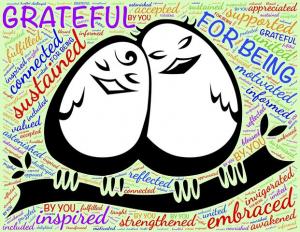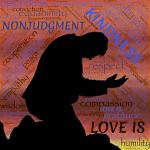 Matthew: I’m often asked about how atheists develop morality and ethics. I understand this confusion on some level as we don’t have an explicit holy book for guidance like religious people do. But as I said in my answer, humans learn what is right and wrong as they develop in their social environments. We also have a general sense of empathy that allows us to sense if others are hurting.
Matthew: I’m often asked about how atheists develop morality and ethics. I understand this confusion on some level as we don’t have an explicit holy book for guidance like religious people do. But as I said in my answer, humans learn what is right and wrong as they develop in their social environments. We also have a general sense of empathy that allows us to sense if others are hurting.
So I’m curious what specifically your book or Scripture provides you with beyond the norms you have picked up from society as well as innate empathy. I can understand it would be helpful to have things explicitly written down, but as we talked about before, there is some room for interpretation. Are the values we pick up in our social environments driving that interpretation?
Ejaz: Muslims believe that all the goodness comes from God. We are born pure and “good” and it’s the societal influence that makes us do the “evil” such as hating, discrimination, lying, cheating and rudeness and so on.
 The interpretations of Scriptures can be clouded by our conscious or unconscious biases and pre-set beliefs, which can be influenced by societal norms. One verse in the Qur’an refers to this human desire to interpret in their own way, in that it declares some verses very clear and others as more subtle or multi meaning.
The interpretations of Scriptures can be clouded by our conscious or unconscious biases and pre-set beliefs, which can be influenced by societal norms. One verse in the Qur’an refers to this human desire to interpret in their own way, in that it declares some verses very clear and others as more subtle or multi meaning.
He it is Who has revealed the Book [referring to the Qur’an] to you; some of its verses are decisive (clear): they are the basis of the Book, and others are allegorical; Then as for those in whose hearts there is perversity they follow the part of it which is allegorical, seeking to mislead and seeking to give it (their own) interpretation. but none knows its interpretation except Allah, and those who are firmly rooted in knowledge say: We believe in it, it is all from our Lord; and none will take heed except those of understanding. The Qur’an 3:7
Here is a small sample of verses and Hadith (sayings of Prophet Muhammad) that I consider ‘clear” commands to do good and behave well.
Call to the way of your Lord with wisdom and goodly exhortation, and have disputations with them in the best manner. The Qur’an 16:125
…..to each among you have we prescribed a law and an open way. If Allah had so willed, He would have made you a single community (“Ummatan Wahida”), but (His plan is) to test you in what He has given you: So vie one with another in good works. Unto Allah you will all return, it is He that will show you the truth of the matters in which you dispute. The Qur’an 5:48
Diversity is divine, so do not discriminate based on color, language etc.
And among His [God’s] signs is the creation of the heavens and the earth and the diversity of your languages and your colors. Indeed in that are signs for those of knowledge. The Qur’an 30:22
Show Kindness to all
Worship God, and join not any partners with Him; and do good(show kindness)- to parents, kinsfolk(relatives), orphans, those in need, neighbors who are near, neighbors who are strangers, the companion by your side, the wayfarer (you meet), and what your right hands possess… The Qur’an 4:36
What is righteousness?
“It is not righteousness that you turn your faces toward the East and the West, (meaning facing Ka’aba for prayers) but righteousness is this that one should believe in God and the last day and the angels and the Book and the prophets, AND give away wealth out of love for Him to the near of kin and the orphans and the needy and the wayfarer and the beggars and for (the emancipation of) the captives, and keep up prayer (Salah) and pay the poor-rate (Zakah); and the performers of their promise when they make a promise (or keep their pledges when they make a pledge), and the patient in distress and affliction and in time of conflicts—these are they who are true (to themselves) and these are they who guard (against evil).” (“Muttaqoon” –God-conscious). The Qur’an 2:177
Standing up for Justice
O you who believe! stand out firmly for justice, as witnesses to Allah, though it may be against yourselves, or your parents, or your kin (relatives), and whether it be (against) rich or poor: for Allah can best protect both…” The Qur’an 4:135
Tolerance and humility
And the servants of Most Gracious (Allah) are those who walk on the earth in humility, and when the ignorant [in reference to pagans of Mecca] address them, they say, ‘Peace!’ [Salaam]. The Qur’an 25:63
Hadith on equality
All mankind is from Adam and Eve, an Arab has no superiority over a non-Arab nor a non-Arab has any superiority over an Arab; also a white has no superiority over a black nor a black has any superiority over a white – except by piety and good action.
Hadith- Be kind to all creatures of God, not just humans(or Muslims):
Those who are kind and considerate to Allah’s creatures, Allah bestows His kindness and affection on them. Show kindness to the creatures on the earth so that Allah may be kind to you.
 Matthew: As I mentioned in my answer, sometimes religious belief can actually have a negative impact on someone’s mental health. If their religion told them they should feel guilty about something they cannot change, it may create a lot of anxiety or depression. However, despite the negative psychological effects, they still believe their faith is true and may not want to change it. If you knew this was the case with a patient or friend of yours, how would you proceed?
Matthew: As I mentioned in my answer, sometimes religious belief can actually have a negative impact on someone’s mental health. If their religion told them they should feel guilty about something they cannot change, it may create a lot of anxiety or depression. However, despite the negative psychological effects, they still believe their faith is true and may not want to change it. If you knew this was the case with a patient or friend of yours, how would you proceed?
Ejaz: In the article you have quoted in your post answering my questions, religiosity is considered very complex and should not be stereotyped. Here is a brief excerpt from the article you quoted.
The empirical literature points to five conclusions. First, some forms of religion are more helpful than others. Well-being has been linked positively to a religion that is internalized, intrinsically motivated, and based on a secure relationship with God and negatively to a religion that is imposed, unexamined, and reflective of a tenuous relationship with God and the world. Second, there are advantages and disadvantages to even controversial forms of religion, such as fundamentalism.
Third, religion is particularly helpful to socially marginalized groups and to those who embed religion more fully in their lives. Fourth, religious beliefs and practices appear to be especially valuable in stressful situations that push people to the limits of their resources. Finally, the efficacy of religion is tied to the degree to which it is well integrated in the individual’s life.
The belief in God should be based on a clear, thoughtful understanding, and the relationship that is formed out of love, not fear. It is of note that the most commonly repeated attributes of God in the Qur’an are NOT the ones that refer to his power or judgment. It is no accident that Rahman (the Most Kind) and Raheem (The Most Merciful) are the most often repeated names of God in the Qur’an.
I agree that the belief in God and “religiosity” cannot be imposed and must come from within (the first conclusion of the author in the article quoted above).
And the Qur’an puts it succinctly.
Let there be no compulsion in religion… 2:256
As to what I would tell my friend or a patient about the inability to change, or any guilt depends on the situation. We are only accountable for what is under our control. In other words, if something is not under our power to change, we cannot be held accountable for it. However what we are able to change and not change can be very subjective.
My readers are welcome to comment and give their own take on the questions Matthew has posed (or my answers).












